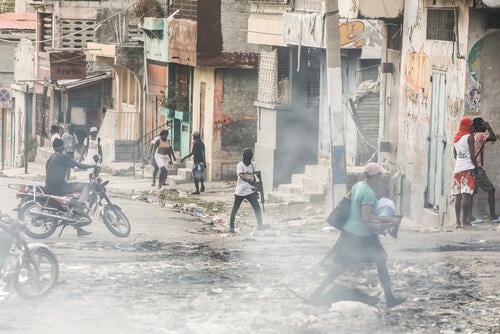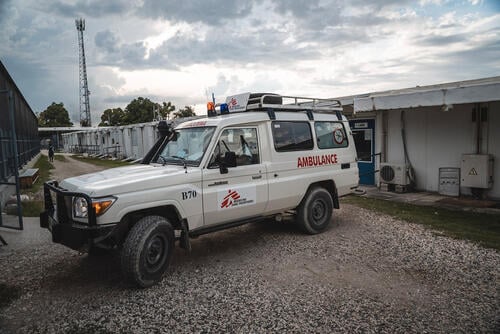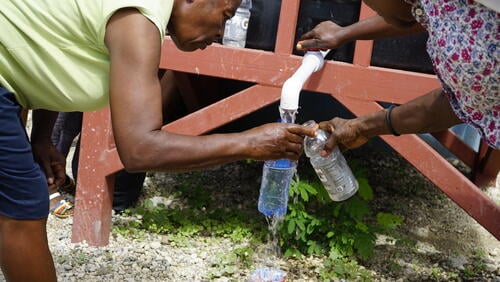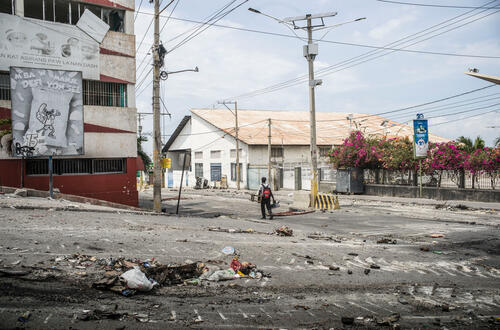Dr Priscille Cupidon, medical activity manager of the Médecins Sans Frontières (MSF) urban violence project in Port-au-Prince, the capital of Haiti, explains how the chronic extreme violence gripping the city has impacted medical care and healthcare workers like her.
I am a doctor in Haiti’s capital, Port-au-Prince, hearing gunfire as armed groups and police battle for control of our city.
This kind of fighting began several years ago, but in recent weeks it has become increasingly violent, like a war. On 28 February, it was announced that elections could be postponed until August 2025. Armed civilian groups reacted by uniting against the government, attacking police stations, administrative offices, banks, port and airport facilities, and other state institutions. This prevented the prime minister from returning to Haiti, given that our airports were closed.
The violence is now like gangrene, spreading and threatening us all. Throughout the city, many people have fled because their homes were burnt down or looted by groups that attacked their neighbourhoods. More and more areas of the city are emptying out as the conflict progresses. Tens of thousands of people have moved into schools, churches, or sports fields in undignified conditions where they lose their privacy and become more vulnerable.
The situation in Port-au-Prince today is a humanitarian crisis and it demands an urgent response, especially for vital needs including healthcare, water and sanitation.Dr Priscille Cupidon, MSF medical activity manager Haiti
Others remain in homes that have become unliveable, exposed to crossfire and looting. Recent violence has even made it more difficult to access drinking water in some neighbourhoods, because water trucks could not resupply them.
The situation in Port-au-Prince today is a humanitarian crisis and it demands an urgent response, especially for vital needs including healthcare, water and sanitation.
I manage a mobile clinic run by MSF that provides healthcare in some of the city’s chronically violence-affected neighbourhoods. We see the direct and indirect effects of violence on the health of our patients. These include adults struggling to manage chronic illnesses such as diabetes, and children with fevers and diarrhoea. Extreme stress often causes mental trauma or hypertension. Many people have skin infections due to a lack of water for hygiene.
Our team visited a neighbourhood near the centre of the city on 19 March, where we hadn’t had access since 29 February. The medical needs in the area are very high and are only likely to grow now that healthcare is so limited. For example, we saw patients suffering from tuberculosis who do not feel safe to leave the neighbourhood for treatment due to conflict and tension between different zones. Barricades and fighting across the city have since prevented our mobile clinic staff from going to work, leaving these patients in a very vulnerable situation.
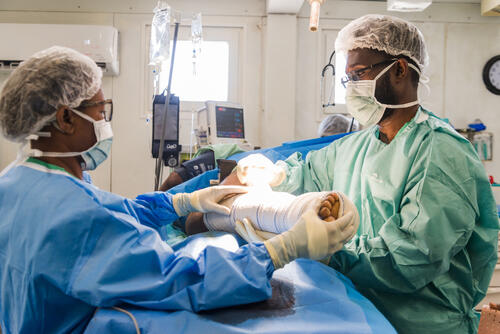
The women we have seen in our mobile clinics in recent months are often survivors of violence, including rape. As a doctor and as a woman, I can tell that many are afraid to talk about it, because the threat is still in the community. Social stigma can also make survivors reluctant to come forward, because they do not want their families and neighbours to know what happened to them. We do everything we can to make survivors feel safe when they confide in us, but many are already pregnant or have a sexually transmitted infection at that point. We accompany them to our main clinic for sexual violence.
For years, health professionals in Haiti have been working in a difficult environment. The country’s deepening political and economic crises have left medical facilities with few resources. Our healthcare system is falling apart.
Like other professionals, healthcare workers have been individually targeted by violence as the situation has worsened. Doctors and nurses have left the country for the United States and elsewhere, including friends and colleagues. Now there aren’t many of us left.
The violence is also preventing patients and staff from reaching medical facilities on a daily basis. Some hospitals, such as Haiti’s State University Hospital, cannot currently function. Another university hospital, Saint-François de Sales, has been completely vandalised and young doctors can no longer complete their training there. The only public university hospital still in operation is La Paix, but it is often overloaded and lacking in resources. Tragically, more women with high-risk pregnancies may die as a result.
The violence is preventing patients and staff from reaching medical facilities on a daily basis. Some hospitals, such as Haiti’s State University Hospital, cannot currently function.Dr Priscille Cupidon, MSF medical activity manager Haiti
Haiti’s main port and airport are now closed, and the Dominican Republic has tightened restrictions on the countries’ border. Given the turmoil of recent weeks, the departure of professionals from Haiti, including doctors and other healthcare workers, could accelerate once travel becomes possible again.
Those of us still in Haiti are doing our best to serve the community when we can, but we also need care, especially mental health support, because we are witnessing so much violence and cruelty.
We’d like to be able to regain at least the serenity we had a few years ago. Today, we work, go home, and lock ourselves in a cage. I’m convinced that all my Haitian brothers and sisters will unite with me in saying that right now we want to live our lives. It’s a right we’ve lost.



